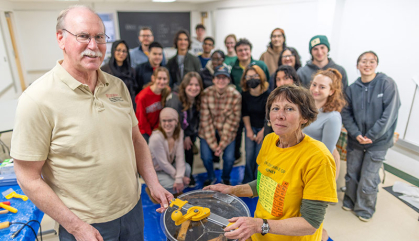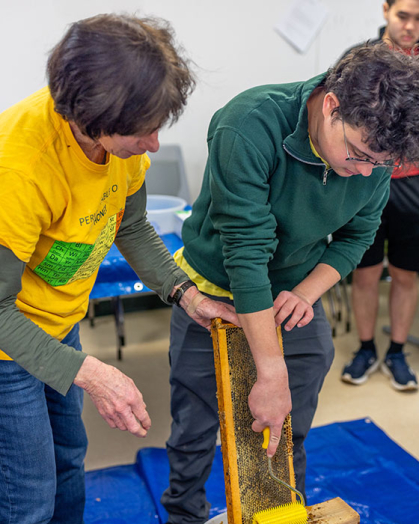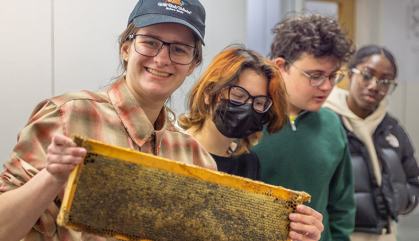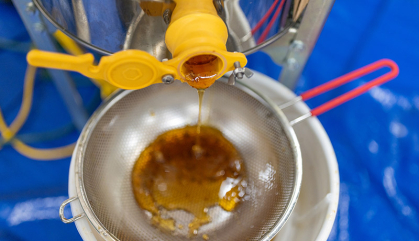A Rutgers research duo conveys the critical importance of honey bees to students and the public through teaching and research
Michael Haberland stood at the edge of a towering granite cornice on a boom lift high above a playground in Paterson, N.J. He was there to remove a massive honey bee hive that threatened the safety of schoolchildren and was wedged between the stone structures of the century-old school building.
As he carefully worked, he couldn't help but marvel at the bees' calm demeanor, even as he dismantled their home, a 150-pound mass of wax and honey.
"The bees were actually really nice," said Haberland, an associate professor and County Environmental Agent with Rutgers Cooperative Extension, after surviving unscathed. "Even when I was taking apart their honeycomb, they were not aggressive at all."

Handling beekeeping tasks is all in a day's work for Haberland, who uses applied research and collaborates with organizations to develop programs that promote innovative, bee-positive environmental practices. Over nearly a decade, Haberland and his research partner, his wife Debra Haberland, have developed a deep understanding of bee behavior.
Their work is a blend of scientific research, education, and environmental advocacy, all aimed at ensuring the health and sustainability of honey bee populations.
"I use beekeeping and the creation of native pollinator habitat for research and as a way to educate the public on the importance of pollinators," Michael said.
Their subject is the honey bee, known formally as the Western honey bee with the species name Apis mellifera. The small, flying insects play an outsized role in maintaining a balanced environment, pollinating flowers, fruits and vegetables by transferring pollen from one part of a plant to another. They assemble in colonies, which are essentially big families, live in hives and are divided into three types of adults - the queen, the all-female workers and the all-male drones.

Honey bees face a host of threats: habitat loss, climate change, invasive species, pathogens and pesticide exposure.
"The goal of my research is to produce queens and nucleus hives to increase the availability of locally raised and adapted bees," said Debra Haberland, who also conducts research under the auspices of her beekeeping company, Working Girls Meadows. "I do this in order to assist the survival and health of bees in our area."
By conducting research that is advancing queen bee fertility, they hope to preserve honey bees' existence. By teaching beekeeping classes to undergraduates and the public, they aspire to convey the vital role honey bees play in the Earth's ecosystem.
The couple met while pursuing their graduate studies in marine biology at the Moss Landing Marine Laboratory in California. Their shared passion for aquatic biology and environmental science brought them together, setting the foundation for their long-standing partnership in both their personal and professional lives. The Haberlands have been married 38 years.
Their research focuses on improving the health and sustainability of honey bee colonies, with a particular emphasis on queen bee health and genetics. In a collaboration with Penn State University Extension, they are working on techniques to breed healthier honey bee queens to improve the overall health of bee colonies.

Together, they teach an undergraduate course at the Rutgers School of Environmental and Biological Sciences called "Apiculture," which covers the intricacies of beekeeping and honey extraction. For the class, students are required to bring a beekeeping veil and use The Beekeeper Handbook by Diana Sammataro and Alphonse Avitabile as their textbook.
The Haberlands said the course often has a profound impact on students, with many developing an appreciation for honey bees and their role in the ecosystem.
"While I already found honey bees to be absolutely marvelous and awe-inspiring social creatures prior to this class, this class absolutely made me even more appreciative of honey bees and the role they play in agriculture around the world," said Russell Gurland, a student majoring in ecology, evolution and natural resources.
The course is designed for students with or without a background in science and is held weekly during the academic year on Cook Campus in New Brunswick, N.J. Students experience hands-on beekeeping while learning about various topics, including the natural history of honey bees, anatomical features of the insect and bee colony management techniques.
The Haberlands teach that honey bees produce honey, a sweet substance made from nectar. The bees store honey in their hive to use as food during the winter when flowers aren't blooming. They also produce beeswax, which is used to build the honeycomb structure in their hives.
Students learn the art of honey extraction, which some view as a highlight of the course. Using live honey bee frames extracted from a hive, the class, overseen by Michael and Debra Haberland, performs the intricate process - using tools to scrape off beeswax cappings from the honey cells, placing it all in an old-fashioned extractor, and rotating the device with a hand crank. The amber goo is filtered and poured into jars. Students go home with the fruit of their efforts.

"It was super exciting," Gurland said. "While we had learned about some of the methods prior to this class, applying what we had learned was so fascinating and fun."
After the honey is collected, the frames are cleaned and returned to the hive for the bees to refill them. This step ensures that bees have enough resources to continue their work.
"One hive needs at least 60 pounds of honey to survive the winter," Debra Haberland said.
The Haberlands teach students the proper techniques to ensure the bees have enough food to survive.
Their dedication to beekeeping extends beyond the classroom. They are passionate advocates for environmental conservation and emphasize the importance of native plants and habitat preservation for bee health.
"The destruction of habitat is one of the biggest issues with plants and animals going extinct or declining in population numbers," Michael Haberland said.
Their efforts to educate the public include teaching a course called "Bee-ginner's Beekeeping: The Basics of Apiculture" through the New Jersey Agricultural Experiment Station. This self-paced online course provides information that new beekeepers need to start and care for a honey bee colony.
The Haberlands continue their research on honey bee queens.
"Our goal is to always make healthier queens that are more resistant to the Varroa mite and pathogens," Michael Haberland said.
They also are working to expand their educational programs to inspire more people to take up beekeeping and contribute to environmental conservation. They are looking to spark interest in the next generation of environmental stewards.
Nicole Shevera, a junior majoring in entomology who took the couple's apiculture class this spring, has received the message.
"Taking this class has definitely pushed me to want to have my own hive once I have moved somewhere that has the proper land for it," Shevera said. "As of now, I will most likely advocate for more native bee gardens and try my best to educate others on how spectacular bees can be."






